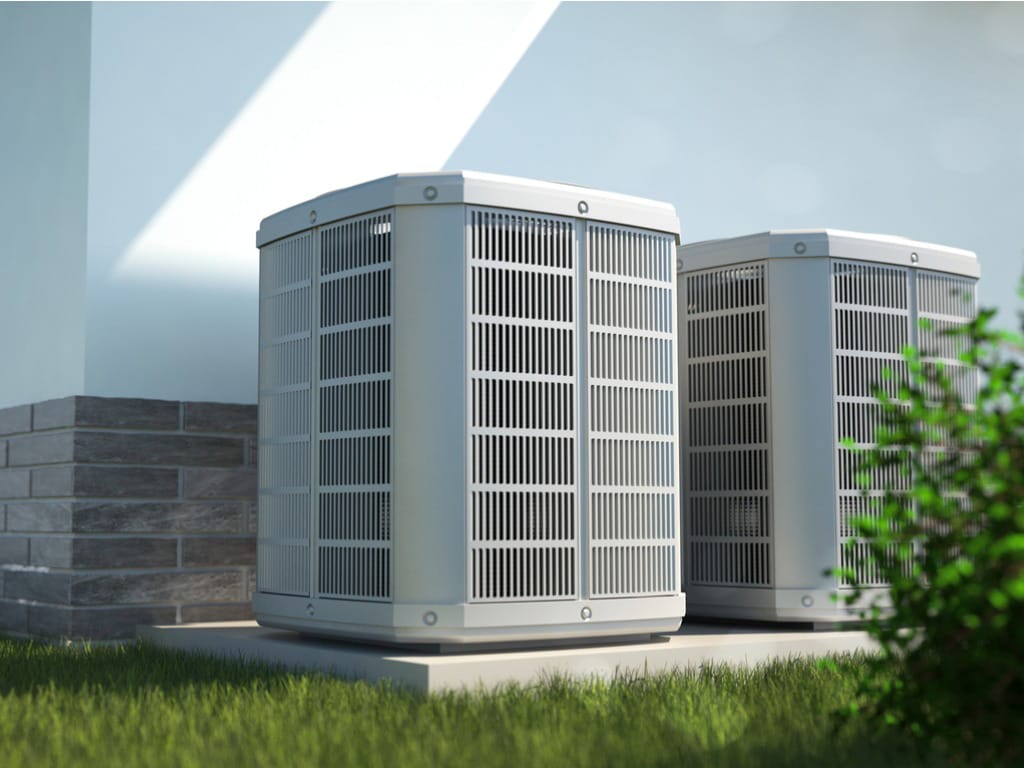
“Summertime, and the living’s easy” — except when your air conditioner unit begins to malfunction. The heat begins to creep inside, and the discomfort settles in. You might think, “Should I repair my air conditioner? Or should I replace my air conditioner?” The answer depends on a few factors.
We broke down the most common questions about whether to repair or replace your air conditioner and the nuances of each so that you can make the right choice.
What types of AC repairs are inexpensive?
What types of AC repairs are more expensive?
What kinds of problems require AC replacement instead of AC repair?
What is the life expectancy of an air conditioner?
Will a more energy-efficient air conditioner system offset the cost of a new one?
How much does a new central air conditioning unit cost?
What types of AC repairs are inexpensive?
Quite often, your AC woes might need a simple fix. Here are a few common AC problems that can be fixed at a low cost:
Air Filter Replacement
Replacing your air filters should be done frequently. The thin mesh through which air passes gets denser as the filter captures an increasing amount of the natural particulate pollution of your home, such as dust, mold, fungus spores, pet hair, fabric fibers, etc. As a result, air won’t flow through as easily.
Your air filter will operate less effectively, or it could stop functioning completely if you don’t replace it frequently enough. A good rule of thumb is to replace your air filters every three months.
Thermostat Repair
Sometimes your thermostat can be putting out the wrong reading, resulting in your HVAC system not kicking in at the appropriate time. This can be as easy as a quick repair or replacing it altogether.
Your HVAC system will operate more effectively with a better thermostat. If your thermostat is over 10 years old, upgrading to a programmed thermostat will undoubtedly make your system function more smoothly.
Newer models are often programmed with smart tools so you can control the temperature of your home right from your phone.
Refrigerant Refill
If you haven’t filled the refrigerant in some time (think once every two to five years) it might be time to do so.
The refrigerant is the lifeblood of an AC system, and a low refrigerant level can cause the system to malfunction. However, simply refilling the refrigerant may not be a long-term fix for the problem. A low refrigerant level is often a sign of a leak in the AC system, which must be identified and repaired to prevent further refrigerant loss. Moreover, adding too much refrigerant can cause the system to malfunction or even damage the compressor.
We recommend leaving this task to a professional HVAC technician who can diagnose and fix the underlying issue.
What types of AC repairs are more expensive?
If some of the problems we’ve discussed don’t apply to your situation, there are AC repairs that are more expensive but cheaper than replacing the whole unit. Making these repairs may extend the lifespan of your system and save you hassle in the long run.
AC Compressor
If your home’s air conditioning unit is not cooling properly, a faulty AC compressor could be the culprit. The compressor is responsible for pressurizing and circulating the refrigerant throughout the AC system, making it an essential component for proper cooling.
If your compressor is beyond repair, replacing it is often the best option to get your AC unit up and running again. However, replacing an AC compressor is a complex task that requires specialized knowledge and tools. It’s important to hire a licensed HVAC professional to ensure the job is done correctly and safely. In some cases, repairing the compressor may be a viable option, but it’s best to consult with a professional to determine the most cost-effective and long-lasting solution.
Evaporator Coil Replacement
If you continue to experience problems with your AC, it could be due to a malfunctioning evaporator coil.
The evaporator coil plays a crucial role in the cooling process, as it absorbs heat from the air inside your home. Over time, these coils can become corroded or damaged, resulting in reduced cooling efficiency and a higher energy bill. In some cases, evaporator coil replacement may be necessary to get your AC working properly again. Again, it’s important to hire a professional HVAC technician to handle this task, as attempting to replace the coil yourself can be dangerous and result in further damage to your system.
What kinds of problems require AC replacement instead of AC repair?
When it comes to air conditioning problems, some issues can only be resolved with a replacement system. These are some AC problems that require a replacement:
Major Refrigerant Leaks
One of the most significant problems that requires a replacement is a major refrigerant leak. Refrigerant is the substance that cools the air in your AC unit, and when it leaks out, your AC system cannot function properly. Attempting to repair a major refrigerant leak is not only expensive but can also be dangerous, as refrigerant is a toxic substance that can harm your health and the environment. Therefore, replacing the entire system is the only viable option.
Compressor Failure
Another issue that requires a replacement is compressor failure. The compressor is the heart of your AC system, and when it fails, your system will not be able to cool your home effectively. Replacing the compressor is possible, but it is often costly, and there is no guarantee that it will fix the problem. Furthermore, if your compressor has failed, it is likely that your AC unit is already quite old, and a replacement may be more cost-effective in the long run.
Cracked Heat Exchanger
The heat exchanger is responsible for transferring heat between the indoor and outdoor units of your AC system. If it cracks, it can release dangerous gases like carbon monoxide into your home. This is a serious safety hazard and requires immediate attention. Attempting to repair a cracked heat exchanger is not possible, and therefore, a replacement is necessary.
What is the life expectancy of an air conditioner?
On average, an air conditioner should last anywhere from 10 to 15 years with proper maintenance. However, factors such as usage, installation quality, and climate can affect this lifespan. For example, if you live in an area with a lot of humidity like Charlottesville or use your AC unit constantly, it may not last as long as one that is only used occasionally or in a drier climate.
Will a more energy-efficient air conditioner system offset the cost of a new one?
One question often arises when considering a new air conditioner is whether investing in an energy-efficient system is worth the cost. The short answer is yes.
While an energy-efficient air conditioner may have a higher upfront cost, the potential savings on energy bills can offset that cost over time. Let’s explore some of the benefits of investing in an energy-efficient air conditioner.
An energy-efficient air conditioner uses less energy to cool your home.
This means that it will consume less electricity and, as a result, lower your monthly energy bills. According to the U.S. Department of Energy, upgrading to an energy-efficient air conditioner can save homeowners up to 20 to 40% on their cooling costs.
An energy-efficient air conditioner can also have a longer lifespan than a traditional system.
This is because these systems are designed to work smarter, not harder. They use advanced technology, such as variable speed motors, to maintain a consistent temperature in your home without constantly turning on and off. This can reduce wear and tear on the system, extending its lifespan and reducing the need for costly repairs.
Investing in an energy-efficient air conditioner can also have environmental benefits.
Traditional air conditioning systems consume a significant amount of energy, which can contribute to greenhouse gas emissions and climate change. By upgrading to an energy-efficient system, you can reduce your carbon footprint and do your part to protect the environment.
So, will a more energy-efficient air conditioner system offset the cost of a new one? The answer is yes, in the long run. While the initial cost may be higher, the potential savings on energy bills and the longer lifespan of the system make it a worthwhile investment.
How much does a new central air conditioning unit cost?
When it comes to buying a new central air conditioning unit, the cost can vary widely depending on a few key factors.
First, the size of the unit is a major consideration, as larger units will generally cost more than smaller ones. Additionally, the efficiency rating of the unit can impact the price, as more efficient models may cost more upfront but save money on energy bills over time. Finally, installation requirements can affect the overall cost, as more complex installations may require additional labor and materials.
Overall, homeowners can expect to spend anywhere from $3,000 and $8,000 on a new central air conditioning unit plus installation, depending on these and other factors.
Repair or Replace? Let the experts help you decide!
If you’re still wondering if you should repair or replace your air conditioner, give us a call. Generally speaking, if an AC unit is more than 10 years old and requires frequent repairs, it may be best to replace it. While repairing an older unit may seem like a cost-effective solution, it could end up costing you more in the long run. Let’s discuss your situation. At Fitch Services, we have years of experience diagnosing and fixing systems just like yours.
To schedule an appointment with Fitch Services in Charlottesville, Va., call (434) 296-9980 or use our contact form.




